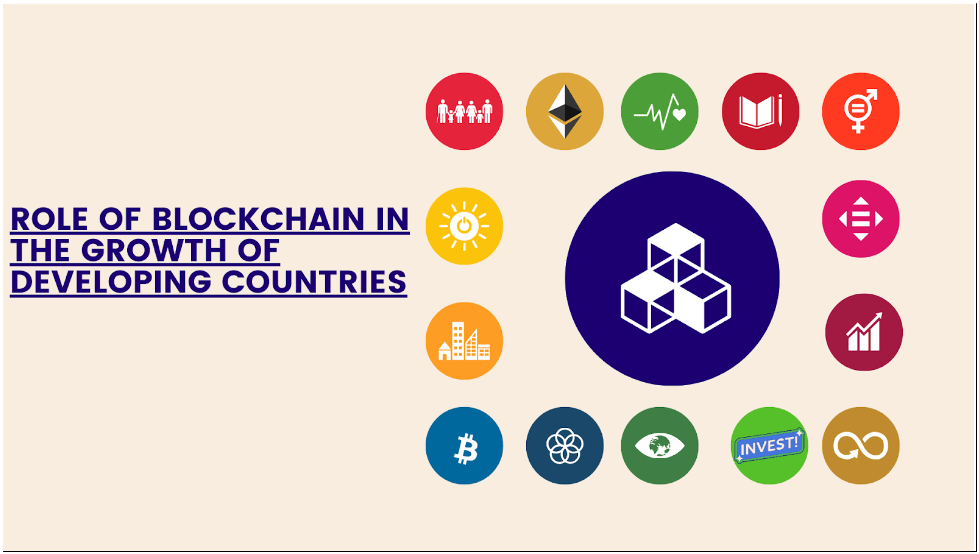ROLE OF BLOCKCHAIN IN THE GROWTH OF DEVELOPING COUNTRIES

Blockchain technology is playing an important role in driving economic growth and development in developing countries. Its decentralized and transparent nature makes it a powerful tool for addressing key challenges and creating new opportunities for prosperity. Let’s explore with me how can blockchain assist developing countries to grow?
FINANCIAL INCLUSION (FI)
FI is all about making sure everyone, including individuals and businesses, can easily access important financial services like bank accounts, credit cards, and savings options. It’s a big deal in global policies, with the United Nations even making it part of their Sustainable Development Goals. Having access to financial services can boost economic activity because it helps people get the money they need to spend and invest. When people have better access to financial services, poverty and income inequality decrease in developing countries. But, there’s still a long way to go. More than 1.7 billion people worldwide don’t have basic financial services, especially in underdeveloped and developing countries. So, there’s a lot of work to be done to make sure everyone has the financial tools they need to thrive.
Many people in developing countries lack access to traditional banking services, but blockchain technology enables them to access financial services directly through their mobile phones. This empowers individuals to save, borrow, and send money securely and affordably, thereby stimulating economic activity and reducing poverty.
PROPERTY RIGHTS
Securing property rights, whether it’s for real estate or intellectual property, is crucial for economic development. When property rights aren’t secure, it can lead to informal activities that hurt small businesses and deter foreign investments, which are vital for growth. Studies have shown that strong property rights protection attracts more foreign investments.
Unfortunately, in many underdeveloped regions, land ownership is a major obstacle to entrepreneurship and economic growth. For example, much of the land in rural Africa and India isn’t properly registered. This lack of registration creates problems like corruption and disputes over land ownership.
Blockchain technology offers a solution to these issues. It ensures transparency and accuracy in property records, especially in countries with weak systems. Blockchain can also help displaced individuals, such as those affected by natural disasters or wars, secure their property rights. By providing legal status and security, blockchain can enable property to be used as collateral for loans. This could unlock trillions of dollars in capital that’s currently tied up due to incomplete land records. Blockchain-based systems can also streamline property registration processes and reduce disputes.
Several initiatives around the world are already using blockchain for property registration. For example, Bitland has introduced a blockchain-based land registration system in Ghana, and India plans to implement blockchain for land records in two states. However, some projects face challenges, like political opposition, as seen in Honduras when the World Bank withdrew support for a blockchain-based land registration system due to political reasons.
CONTROLLING CORRUPTION
Corruption is a significant problem in business, finance, and government, where dishonest practices like bribery and fraud are common. This undermines trust and damages economies. Reducing corruption is vital for attracting investment in developing countries. Although bribery may seem to expedite processes, it ultimately discourages long-term investments and stifles growth.
Blockchain technology could be a powerful tool in combating corruption. It acts as a digital ledger, recording every transaction and ensuring transparency. Because blockchain transactions are secure and transparent, there’s less opportunity for corrupt activities like money laundering. Blockchain can assist subsidiaries of multinational companies in developing countries by improving relationships between headquarters and branches, within supply chains, and with governments. Researchers have identified numerous areas where blockchain could effectively fight corruption.
SUPPLY CHAIN MANAGEMENT
Supply Chain Management (SCM) has evolved significantly, adopting lean strategies like Just-In-Time (JIT) and outsourcing. However, these changes have led to more complex supply chains where participants are often unknown. The global cost of supply chain disruptions is estimated at $4 trillion USD, with inflationary effects felt worldwide. developing countries and small businesses are hit hardest, facing price volatility, food insecurity, and increased poverty.
Blockchain technology provides transparency across the supply chain, but many companies struggle to see beyond immediate connections. Developing countries face challenges in tracing and verifying the origin and ownership of goods, leading to issues like child labor and mislabeled products. Blockchain offers a solution by creating an immutable record of transactions, ensuring transparency and trust throughout the supply chain. With blockchain, companies can track the journey of products from production to consumption, helping to combat issues like child labor and ensure the authenticity of goods. This technology has the potential to revolutionize supply chain management, promoting ethical practices and consumer confidence worldwide.
DIGITAL IDENTITY:
Millions of people in many developing countries struggle to obtain basic services like healthcare because they do not have formal identification. Their inability to show appropriate identification impacts their capacity to establish their identity and receive essential services. Blockchain technology, however, offers an attractive solution for this issue.
Blockchain technology can be used to establish digital IDs that are safe, transferable, and available to everyone, regardless of socioeconomic background. The integrity and dependability of these digital IDs are guaranteed by the decentralized, tamper-proof ledger on which they are kept. Furthermore, blockchain-based digital IDs simplify the process of obtaining necessary services by making them easily accessible and verifiable for relevant service providers.
In this blog, we have seen how blockchain can play a powerful role in the development of developing countries. Therefore, we strongly recommend developing countries to start implementing blockchain technology for the development and prosperity of the country.
If you want to look deeper into blockchain technology, you can visit our other interesting and informative blockchain blogs.